Search Result
Results for "
endothelial dysfunction
" in MedChemExpress (MCE) Product Catalog:
1
Biochemical Assay Reagents
1
Isotope-Labeled Compounds
| Cat. No. |
Product Name |
Target |
Research Areas |
Chemical Structure |
-
- HY-155946
-
|
Sac-1004
|
Others
|
Cardiovascular Disease
Metabolic Disease
Inflammation/Immunology
Cancer
|
|
CU06-1004 (Sac-1004) is an orally active endothelial dysfunction blocker. CU06-1004 ameliorates endothelial dysfunction by inhibiting hyperpermeability and inflammation, and is potent in inhibiting vascular leakage and inflammation in various animal models, such as diabetic retinopathy, stroke, cancer, and inflammatory bowel disease. CU06-1004 ameliorates CDAA-induced mouse model of NASH. CU06-1004 also improves cardiac function .
|
-
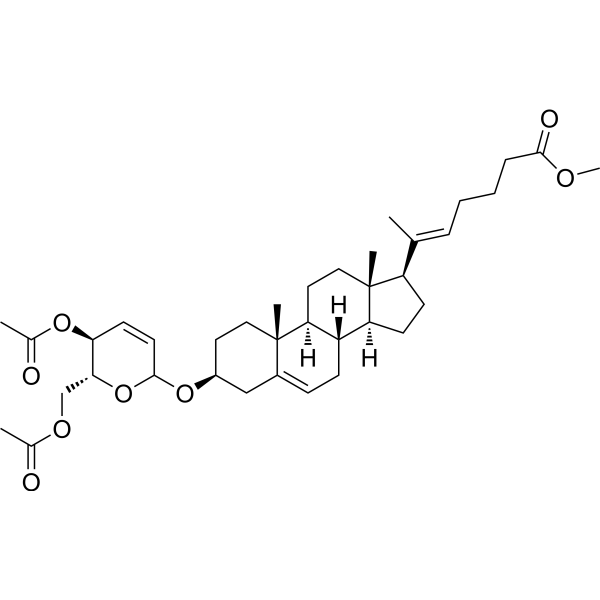
-
- HY-101795
-
|
|
TRP Channel
HPV
|
Infection
Neurological Disease
|
|
Larixyl acetate is a potent and selective TRPC6 inhibitor with IC50 values of 0.58 μM and 6.83 μM against hTRPC6-YFP and hTRPC3-YFP, respectively. Larixyl acetate prevents HPV and is effective in protecting against traumatic brain injury-induced systemic endothelial dysfunction .
|
-
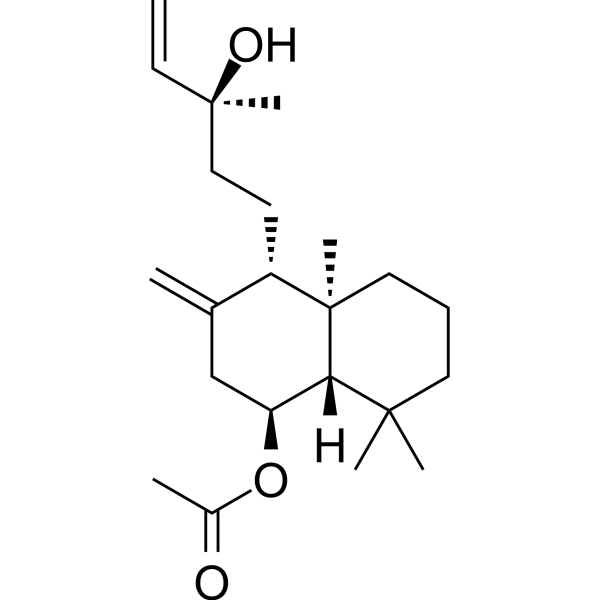
-
- HY-108052
-
|
Delphinidin 3-O-glucoside chloride; Delphinidin 3-O-β-glucoside chloride
|
EGFR
Apoptosis
Akt
|
Cardiovascular Disease
Cancer
|
|
Delphinidin 3-glucoside chloride (Delphinidin 3-O-glucoside chloride) is an active anthocyanin found in Hibiscus sabdariffa extract. Delphinidin 3-glucoside chloride induces a pro-apoptotic effect in B cell chronic lymphocytic leukaemia (B CLL) . Delphinidin 3-glucoside chloride exerts phytoestrogen activity by binding to ERβ, with an IC50 of 9.7 μM . Delphinidin-3-O-glucoside chloride inhibits EGFR with an IC50 of 2.37 µM . Delphinidin 3-glucoside chloride exhibits antitumor effects through pAKT/IRF1/HOTAIR pathway. Delphinidin 3-glucoside chloride exhibits efficacy against oxidative stress, inhibits platelet activation and endothelial dysfunction .
|
-
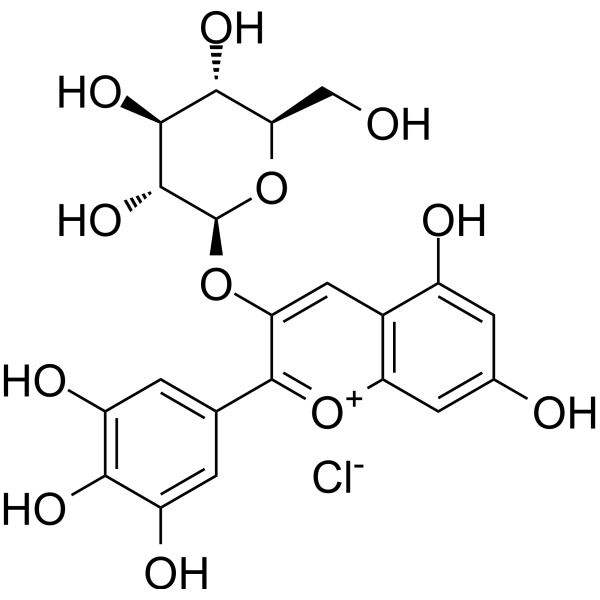
-
- HY-P1184
-
-

-
- HY-P1184A
-
-
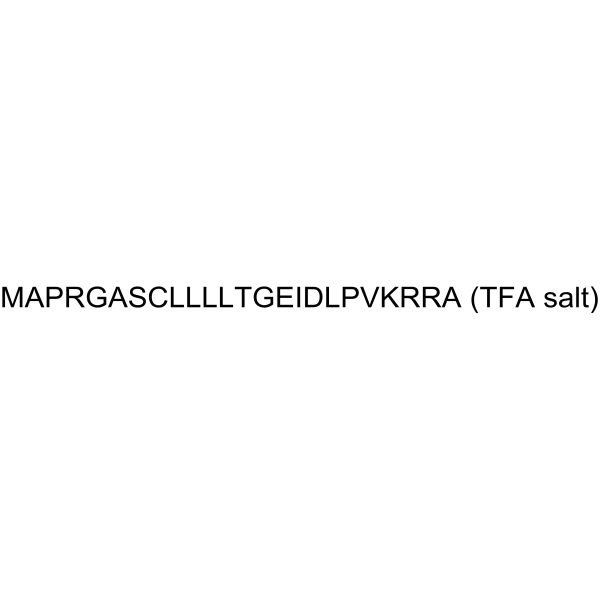
-
- HY-113216B
-
|
NG,NG-Dimethylarginine dihydrochloride
|
NO Synthase
|
Cardiovascular Disease
|
|
Asymmetric dimethylarginine dihydrochloride is an endogenous NO synthase inhibitor that reduces NO production, which contributes to endothelial dysfunction and cardiovascular disease .
|
-
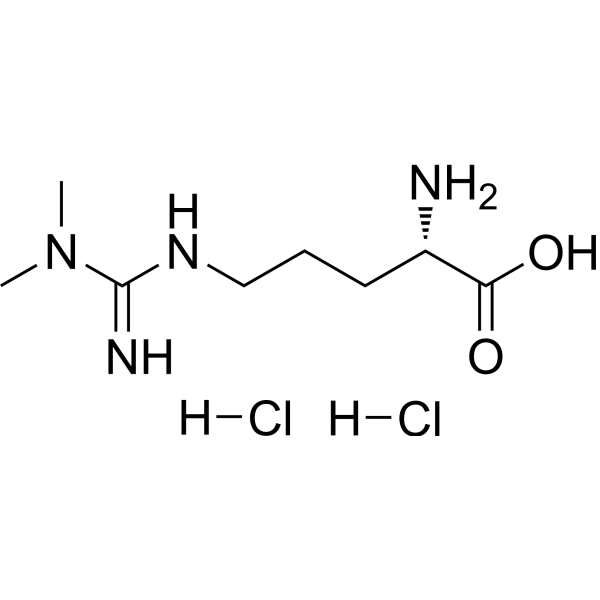
-
- HY-113216
-
-
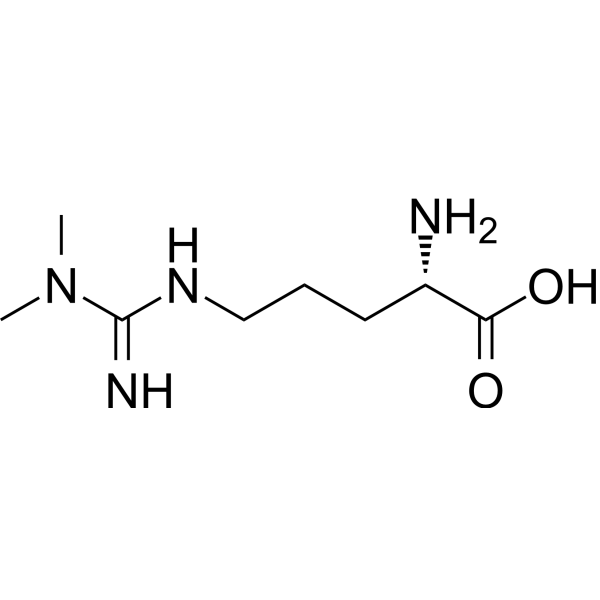
-
- HY-113216S
-
-
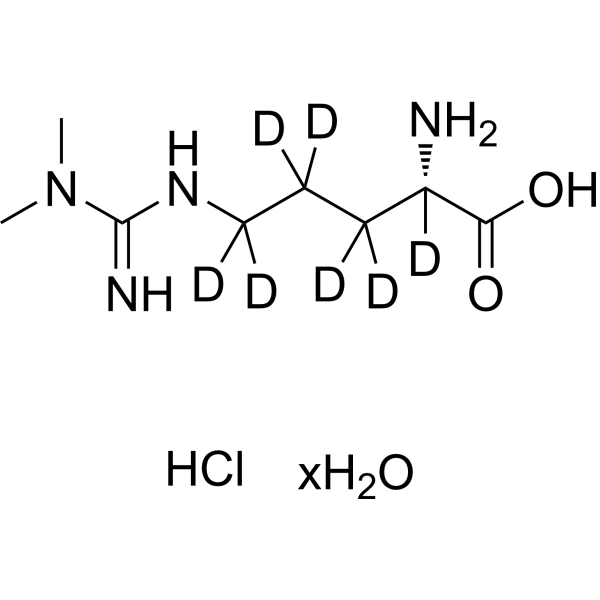
-
- HY-W674241
-
|
|
Endogenous Metabolite
|
Cardiovascular Disease
|
|
4-Ethylphenyl sulfate is a gut microbial metabolite. 4-Ethylphenyl sulfate is also a protein-bound uremic toxin, a xenobiotic substrate, and causes endothelial dysfunction .
|
-
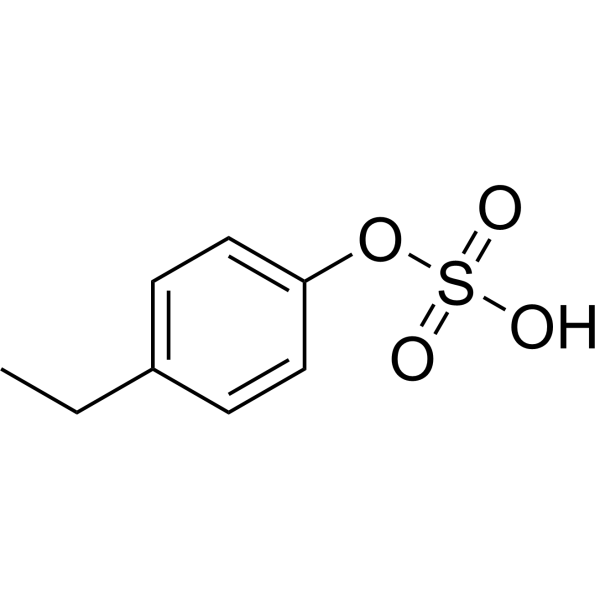
-
- HY-W674241A
-
|
|
Endogenous Metabolite
|
Cardiovascular Disease
|
|
4-Ethylphenyl sulfate sodium is a gut microbial metabolite. 4-Ethylphenyl sulfate sodium is also a protein-bound uremic toxin, a xenobiotic substrate, and causes endothelial dysfunction .
|
-
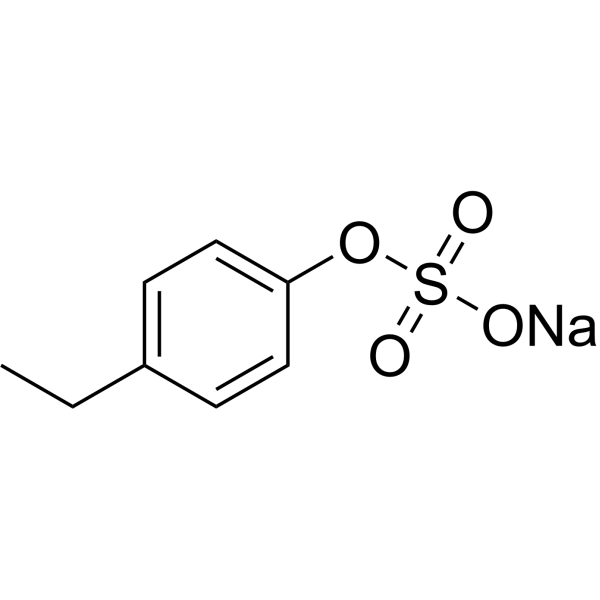
-
- HY-NP013
-
|
Mouse ox-LDL
|
LDLR
|
Cardiovascular Disease
|
|
Oxidized low density lipoprotein (mouse) is an oxidized low density lipoprotein (LDL). Oxidized low density lipoprotein (mouse) induces atherosclerosis (AS) by facilitating endothelial dysfunction and accelerating the VSMCs growth and migration .
|
-

-
- HY-129997
-
|
|
CD38
|
Inflammation/Immunology
|
|
Luteolinidin is a natural deoxyanthocyanidin, isolated from Sorghum bicolor . Luteolinidin is a potent CD38 inhibitor which can protect the heart against I/R injury with preservation of eNOS function and prevention of endothelial dysfunction in vivo .
|
-
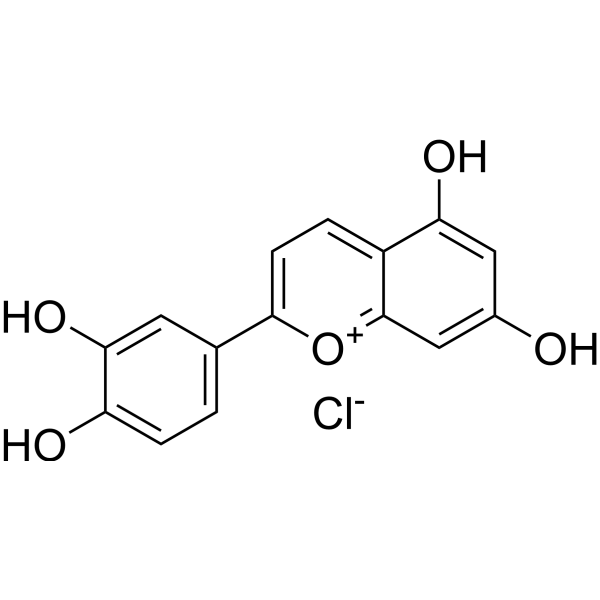
-
- HY-17369
-
|
L700462 hydrochloride monohydrate; MK383 hydrochloride monohydrate
|
Integrin
|
Cardiovascular Disease
|
|
Tirofiban (L700462) hydrochloride monohydrate is a selective and reversible platelet integrin receptor (Gp IIb/IIIa) antagonist that inhibits fibrinogen binding to this receptor and has antithrombotic activity. Tirofiban hydrochloride monohydrate induces proliferation and migration on endothelial cell by inducing production of VEGF. Tirofiban hydrochloride monohydrate can significantly reduces myocardial no-reflow and ischemia-reperfusion injury by alleviating myocardial microvascular structural and endothelial dysfunction in the ischemic area .
|
-
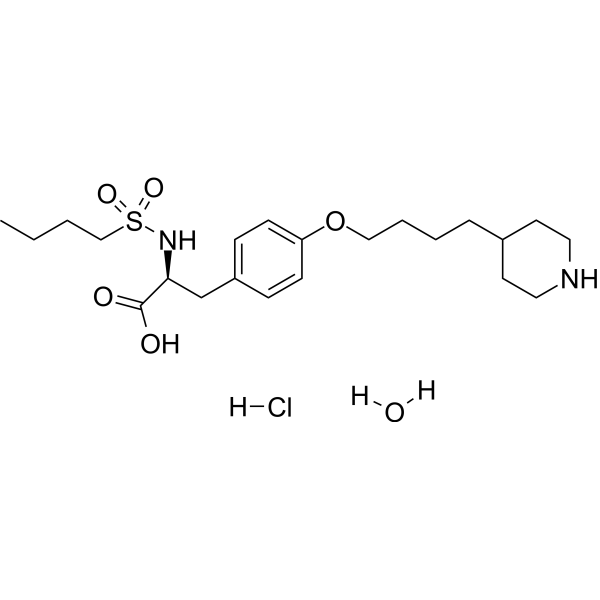
-
- HY-17369B
-
|
L700462; MK383
|
Integrin
|
Cardiovascular Disease
|
|
Tirofiban (L700462) is a selective and reversible platelet integrin receptor (Gp IIb/IIIa) antagonist that inhibits fibrinogen binding to this receptor and has antithrombotic activity. Tirofiban induces proliferation and migration on endothelial cell by inducing production of VEGF. Tirofiban can significantly reduces myocardial no-reflow and ischemia-reperfusion injury by alleviating myocardial microvascular structural and endothelial dysfunction in the ischemic area .
|
-
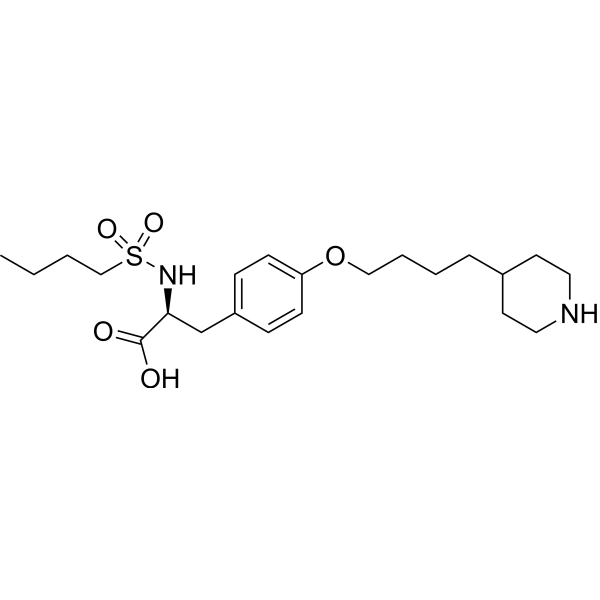
-
- HY-17369A
-
|
L700462 hydrochloride; MK383 hydrochloride
|
Integrin
|
Cardiovascular Disease
|
|
Tirofiban (L700462) hydrochloride is a selective and reversible platelet integrin receptor (Gp IIb/IIIa) antagonist that inhibits fibrinogen binding to this receptor and has antithrombotic activity. Tirofiban hydrochloride induces proliferation and migration on endothelial cell by inducing production of VEGF. Tirofiban hydrochloride can significantly reduces myocardial no-reflow and ischemia-reperfusion injury by alleviating myocardial microvascular structural and endothelial dysfunction in the ischemic area .
|
-
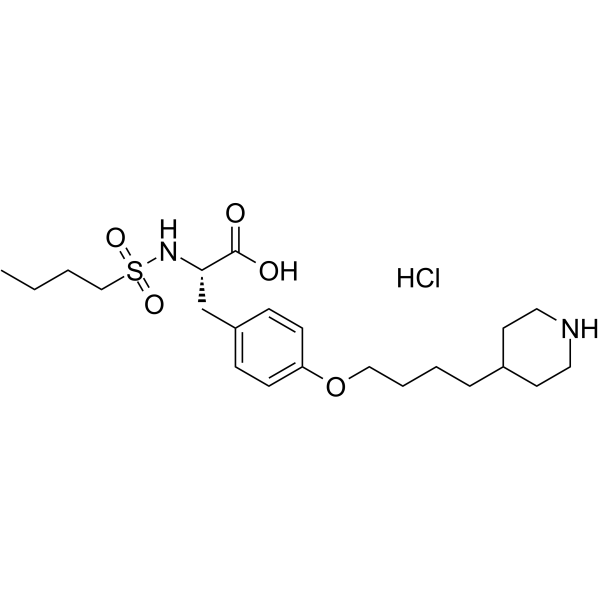
-
- HY-P2310
-
|
|
Bacterial
Parasite
|
Infection
Cardiovascular Disease
|
|
Defensin HNP-1 human is a Human neutrophil peptides (HNPs), involved in endothelial cell dysfunction at the time of early atherosclerotic development. Defensin HNP-1 human exhibits broad antimicrobial and anti-leishmanial activities .
|
-
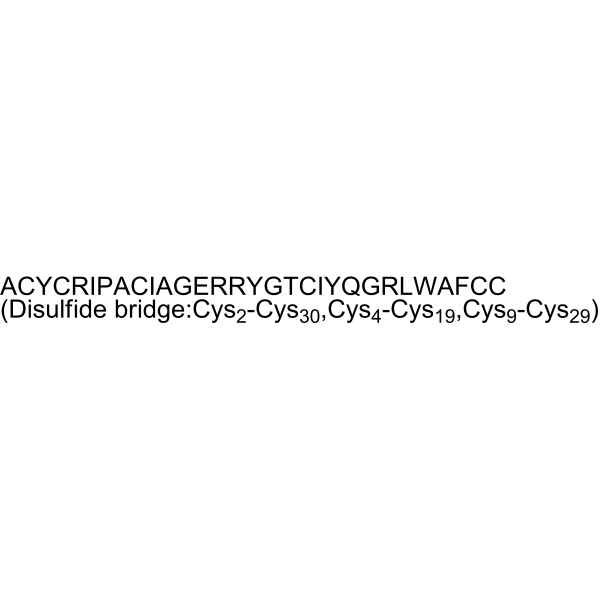
-
- HY-112885A
-
|
Nω-Hydroxy-nor-L-arginine acetate
|
Arginase
Apoptosis
|
Metabolic Disease
Inflammation/Immunology
Cancer
|
|
nor-NOHA acetate (Nω-Hydroxy-nor-L-arginine acetate) is a specific and reversible arginase inhibitor, induces apoptosis in ARG2-expressing cells under hypoxia but not normoxia. Anti-leukemic activity, effective in endothelial dysfunction, immunosuppression and metabolism .
|
-
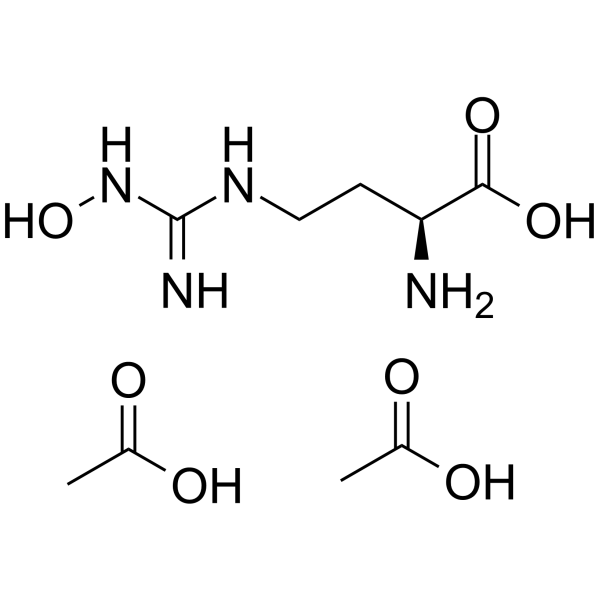
-
- HY-101200
-
|
SIN-1 chloride
|
Drug Metabolite
|
Cardiovascular Disease
|
|
SIN-1 (chloride) is the active metabolite of molsidomine. SIN-1 (chloride) exhibits potent vasorelaxant effect and inhibition of platelet aggregation . SIN-1 (chloride) decreases myocardial necrosis and reperfusion-induced endothelial dysfunction in models of myocardial ischemia-reperfusion .
|
-
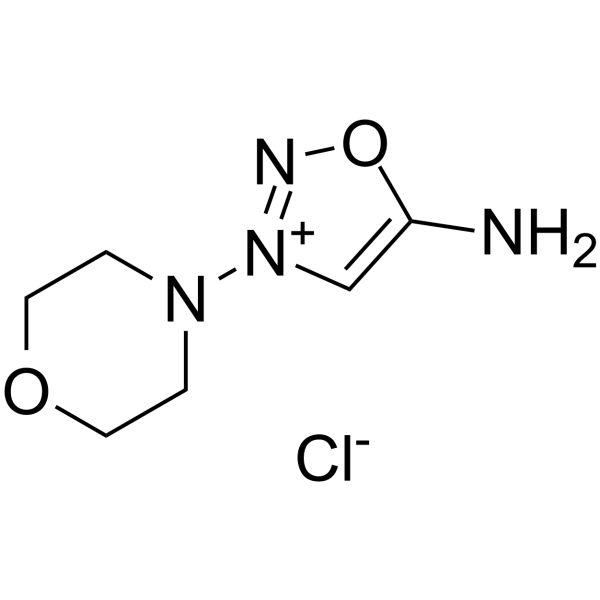
-
- HY-P2310A
-
|
|
Bacterial
Parasite
|
Infection
Cardiovascular Disease
|
|
Defensin HNP-1 human TFA is a Human neutrophil peptides (HNPs), involved in endothelial cell dysfunction at the time of early atherosclerotic development. Defensin HNP-1 human TFA exhibits broad antimicrobial and anti-leishmanial activities .
|
-
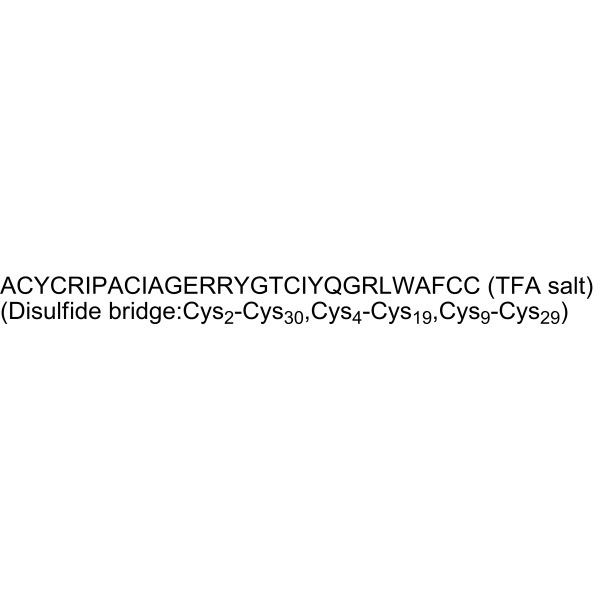
-
- HY-112234
-
|
Sepiapterin
|
Endogenous Metabolite
|
Cancer
|
|
L-Sepiapterin (Sepiapterin) is a precursor of the endothelial nitric oxide synthase (eNOS) cofactor tetrahydrobiopterin (BH4). L-Sepiapterin improves endothelial dysfunction in small mesenteric arteries from db/db mice, and induces angiogenesis. L-Sepiapterin inhibits cell proliferation and migration of ovarian cancer cells via down-regulation of p70 S6K-dependent VEGFR-2 expression .
|
-
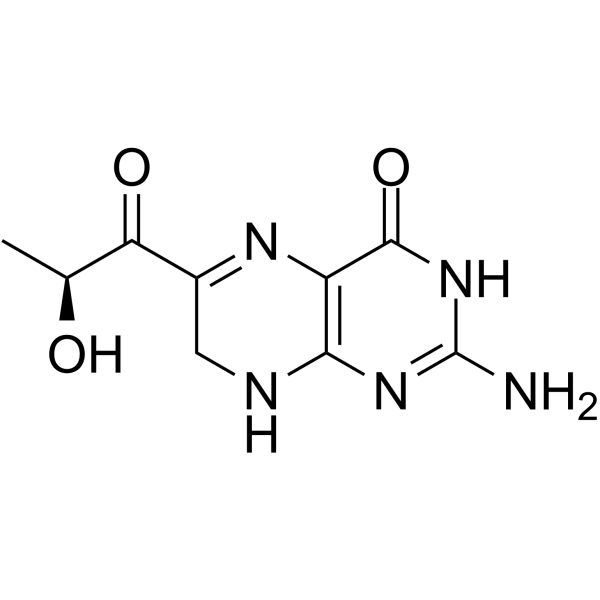
-
- HY-P3199
-
|
|
PKC
|
Inflammation/Immunology
|
|
PKCβII Peptide Inhibitor I is a PKCβII inhibitor. PKCβII Peptide Inhibitor I shows cardioprotective effects in rat cardiac Ischemia/reperfusion injury model. PKCβII Peptide Inhibitor I also prevents vascular endothelial dysfunction .
|
-
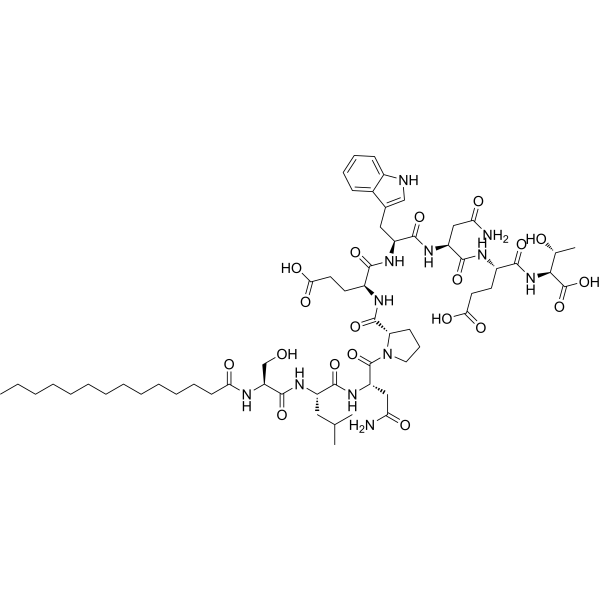
-
- HY-112885C
-
|
Nω-Hydroxy-nor-L-arginine dihydrochloride
|
Apoptosis
Arginase
|
Metabolic Disease
Inflammation/Immunology
Cancer
|
|
nor-NOHA dihydrochloride is a selective and reversible arginase inhibitor. nor-NOHA dihydrochloride induces apoptosis in ARG2-expressing cells under hypoxia. nor-NOHA dihydrochloride has anti-leukemic activity. nor-NOHA dihydrochloride can used in study endothelial dysfunction, immunosuppression and metabolism .
|
-
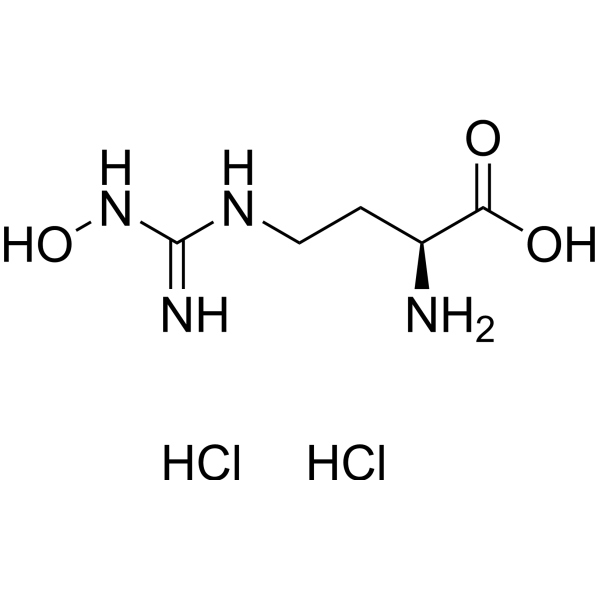
-
- HY-17369BR
-
|
|
|
Cardiovascular Disease
|
|
Tirofiban (Standard) is the analytical standard of Tirofiban. This product is intended for research and analytical applications. Tirofiban (L700462) is a selective and reversible platelet integrin receptor (Gp IIb/IIIa) antagonist that inhibits fibrinogen binding to this receptor and has antithrombotic activity. Tirofiban induces proliferation and migration on endothelial cell by inducing production of VEGF. Tirofiban can significantly reduces myocardial no-reflow and ischemia-reperfusion injury by alleviating myocardial microvascular structural and endothelial dysfunction in the ischemic area .
|
-

-
- HY-17369R
-
|
|
|
Cardiovascular Disease
|
|
Tirofiban (hydrochloride monohydrate) (Standard) is the analytical standard of Tirofiban (hydrochloride monohydrate). This product is intended for research and analytical applications. Tirofiban (L700462) hydrochloride monohydrate is a selective and reversible platelet integrin receptor (Gp IIb/IIIa) antagonist that inhibits fibrinogen binding to this receptor and has antithrombotic activity. Tirofiban hydrochloride monohydrate induces proliferation and migration on endothelial cell by inducing production of VEGF. Tirofiban hydrochloride monohydrate can significantly reduces myocardial no-reflow and ischemia-reperfusion injury by alleviating myocardial microvascular structural and endothelial dysfunction in the ischemic area .
|
-

-
- HY-112885B
-
|
Nω-Hydroxy-nor-L-arginine monoacetate
|
Arginase
|
Metabolic Disease
|
|
nor-NOHA monoacetate is a selective and reversible arginase inhibitor. nor-NOHA monoacetate induces apoptosis in ARG2-expressing cells under hypoxia. nor-NOHA monoacetate has anti-leukemic activity. nor-NOHA monoacetate can used in study of endothelial dysfunction, immunosuppression and metabolism .
|
-
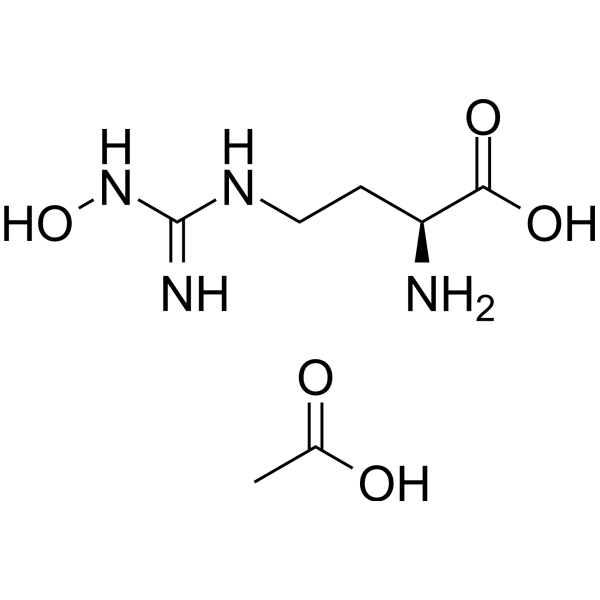
-
- HY-N0194
-
|
|
Apoptosis
Parasite
|
Inflammation/Immunology
Cancer
|
|
Asiatic acid, a pentacyclic triterpene found in Centella asiatica (Centella asiatica), has anticancer activity. Asiatic acid induces apoptosis in melanoma cells and has barrier protective effects on human aortic endothelial cells (HAEC). Asiatic acid also has anti-inflammatory activity and inhibits tumor necrosis factor (TNF)-α-induced endothelial barrier dysfunction. Asiatic acid also inhibits NLRP3 inflammasome activation and NF-κB pathway, effectively inhibits inflammation in rats, and has neuroprotective effects in rat spinal cord injury (SCI) model .
|
-
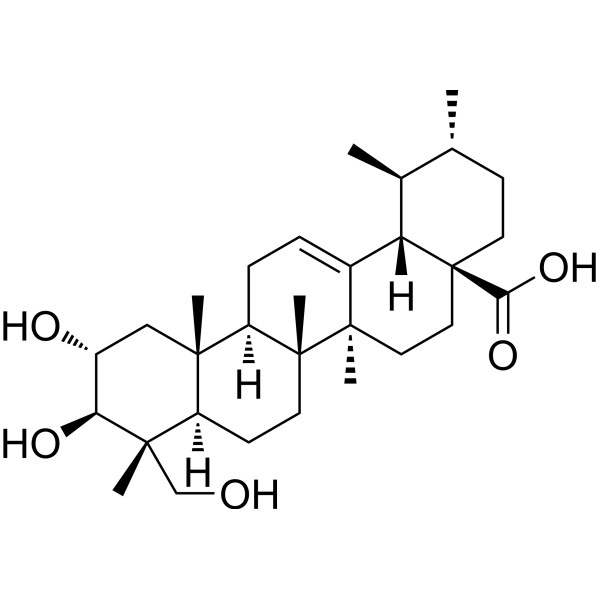
-
- HY-125863
-
|
|
Endogenous Metabolite
|
Metabolic Disease
Cancer
|
|
Glucose-6-phosphate dehydrogenase, Microorganism is the rate-limiting enzyme of the pentose phosphate pathway. Glucose-6-phosphate dehydrogenase is a major source of NADPH that is required by many essential cellular systems including the antioxidant pathways, nitric oxide synthase, NADPH oxidase, cytochrome p450 system, and others. Glucose-6-phosphate dehydrogenase can be used for the research of diabetes, aldosterone-induced endothelial dysfunction, and cancer .
|
-
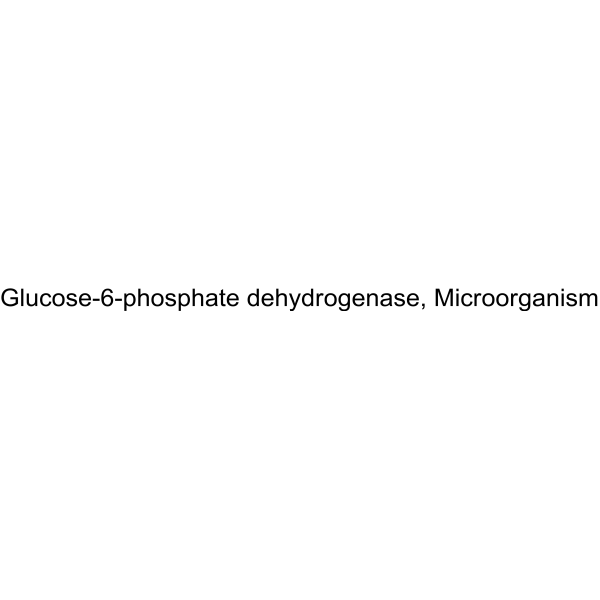
-
- HY-D0190
-
|
HTTA; TTA; TTFA
|
Biochemical Assay Reagents
|
Infection
Others
Cancer
|
|
2-Thenoyltrifluoroacetone is a chelating agent. 2-Thenoyltrifluoroacetone can be used for the complexation of various metal ions including Mn(II), Co(III), Ni(II), et al.. 2-Thenoyltrifluoroacetone possesses antitubercular and cytotoxic activities. 2-Thenoyltrifluoroacetone is also used as common inhibitor of mitochondrial electron flux and to analyze the endothelial cell dysfunction. Besides, copper (II) complex of 2-Thenoyltrifluoroacetone has anticancer activity against K562 .
|
-
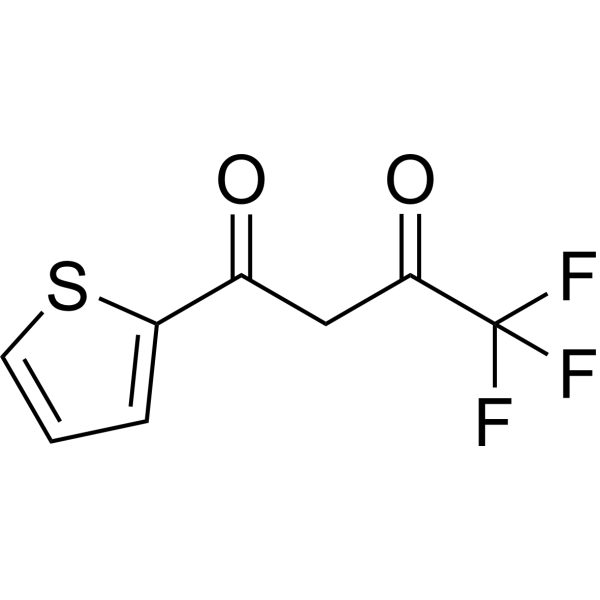
-
- HY-124293
-
AA147
3 Publications Verification
|
ATF6
Reactive Oxygen Species
|
Neurological Disease
Metabolic Disease
|
|
AA147 is a endoplasmic reticulum (ER) proteostasis regulator. AA147 promotes protection against oxidative damage in neuronal cells and prevents endothelial barrier dysfunction by activating ATF6 arm (selectively) of the unfolded protein response (UPR) and the NRF2 oxidative stress response. AA147 can rebalances XBP1s expression in vivo, and also induces survival motor neuron (SMN) expression and spinal motorneuron (MN) protection .
|
-
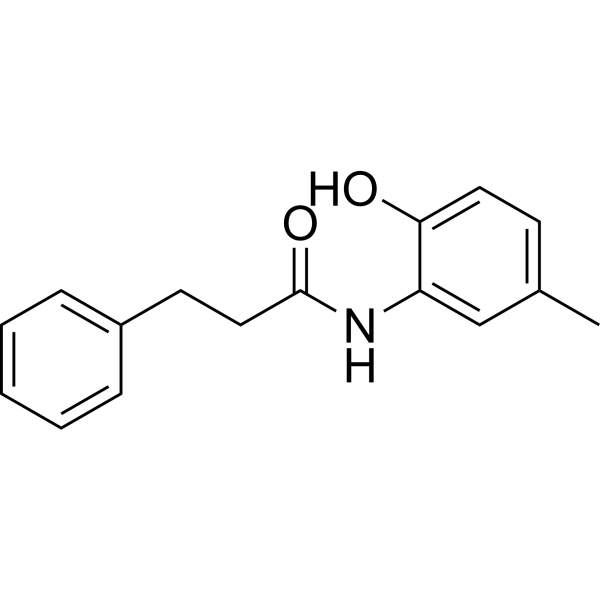
-
- HY-15509A
-
|
CNI-1493; CPSI-2364 tetrahydrochloride
|
TNF Receptor
Interleukin Related
p38 MAPK
|
Inflammation/Immunology
Cancer
|
|
Semapimod tetrahydrochloride (CNI-1493), an inhibitor of proinflammatory cytokine production, can inhibit TNF-α, IL-1β, and IL-6. Semapimod tetrahydrochloride inhibits TLR4 signaling (IC50≈0.3 μM). Semapimod tetrahydrochloride inhibits p38 MAPK and nitric oxide production in macrophages. Semapimod tetrahydrochloride has potential in a variety of inflammatory and autoimmune disorders .
|
-
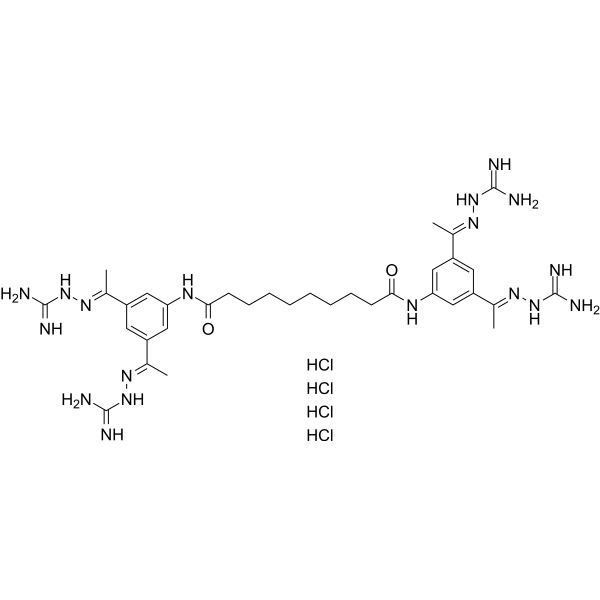
-
- HY-N8243
-
|
|
Others
|
Metabolic Disease
|
|
Coreopsin is a natural product that can be isolated from Coreopsis tinctoria Nutt. flower. Coreopsin can be used for hypertension and diabetes research .
|
-
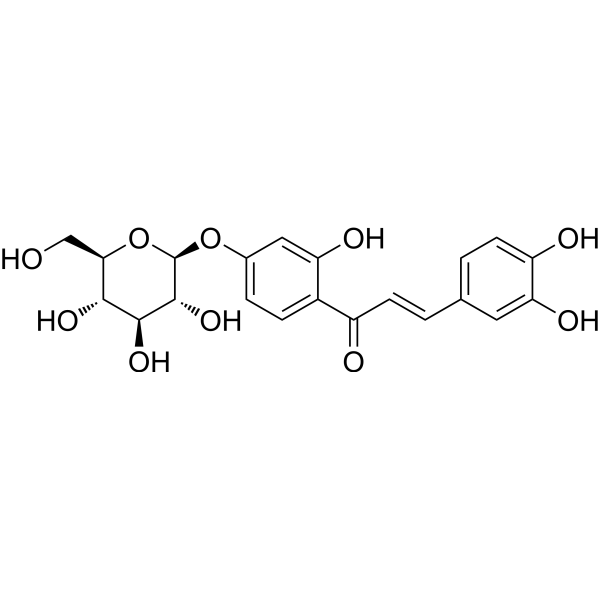
| Cat. No. |
Product Name |
Type |
-
- HY-NP013
-
|
Mouse ox-LDL
|
Native Proteins
|
|
Oxidized low density lipoprotein (mouse) is an oxidized low density lipoprotein (LDL). Oxidized low density lipoprotein (mouse) induces atherosclerosis (AS) by facilitating endothelial dysfunction and accelerating the VSMCs growth and migration .
|
| Cat. No. |
Product Name |
Target |
Research Area |
-
- HY-P2310A
-
|
|
Bacterial
Parasite
|
Infection
Cardiovascular Disease
|
|
Defensin HNP-1 human TFA is a Human neutrophil peptides (HNPs), involved in endothelial cell dysfunction at the time of early atherosclerotic development. Defensin HNP-1 human TFA exhibits broad antimicrobial and anti-leishmanial activities .
|
-
- HY-P1184
-
-
- HY-P1184A
-
-
- HY-P2310
-
|
|
Bacterial
Parasite
|
Infection
Cardiovascular Disease
|
|
Defensin HNP-1 human is a Human neutrophil peptides (HNPs), involved in endothelial cell dysfunction at the time of early atherosclerotic development. Defensin HNP-1 human exhibits broad antimicrobial and anti-leishmanial activities .
|
-
- HY-P3199
-
|
|
PKC
|
Inflammation/Immunology
|
|
PKCβII Peptide Inhibitor I is a PKCβII inhibitor. PKCβII Peptide Inhibitor I shows cardioprotective effects in rat cardiac Ischemia/reperfusion injury model. PKCβII Peptide Inhibitor I also prevents vascular endothelial dysfunction .
|
| Cat. No. |
Product Name |
Category |
Target |
Chemical Structure |
| Cat. No. |
Product Name |
Chemical Structure |
-
- HY-113216S
-
|
|
|
Asymmetric dimethylarginine-d7 (hydrochloride hydrate) is the deuterium labeled Asymmetric dimethylarginine. Asymmetric dimethylarginine is an endogenous inhibitor of nitric oxide synthase (NOS), and functions as a marker of endothelial dysfunction in a num
|
-

Your information is safe with us. * Required Fields.
Inquiry Information
- Product Name:
- Cat. No.:
- Quantity:
- MCE Japan Authorized Agent:







































